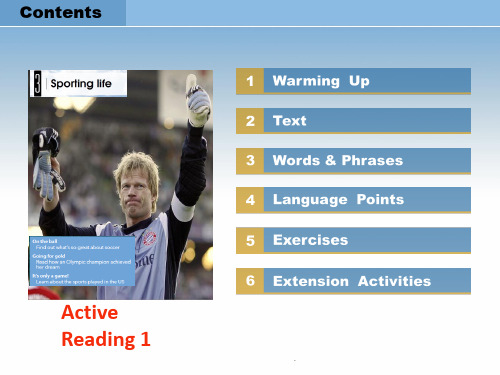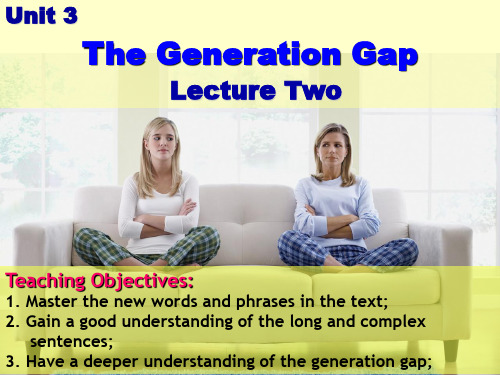全新版大学英语综合教程第二版第二册第三单元教案
- 格式:doc
- 大小:117.99 KB
- 文档页数:12


全新版《大学英语》综合教程第二册教案Unit 1 Ways of LearningText A Learning, Chinese-styleI. Teaching Plan1.Objectives:1)Grasp the main idea (that it would be ideal if we can strikea balance between the Chinese and the Western learning styles) and structure of the text (introduction of the topic by an anecdote---elaboration by comparison and contrast---conclusion by a suggestion);2)Appreciate the difference between comparison and contrast, as well as different ways to compare and contrast (point-by-point method or one-side-at-a-time method);3)Master the key language points and grammatical structures in the text;4)Conduct a series of reading, listening, speaking, and writing activities related to the theme of the unit.3. Pre-reading taskson the road: 1.traveling, esp. for long distances or periods of time在旅行中;在巡回演出中E.g. The band has been on the road for six months. 那支乐队巡回演出已有六个月了。

Unit 3 The Generation GapTeaching Aims:1.Understanding the main idea (Father meddled in children’s affairs with goodintentions ,but only to find his efforts unwelcome) and structure ( three settings,three scense);2.Appreciate the basic elements of a play;3.Grasp the key language points in Texts A and learn to use them in context;4.Understand the cultural background related to the content5.Conducting a series of theme-related reading, listening, speaking, and writingactivities6.Learn to write poster, etc.Teaching Keypoints:1.Grasp the main idea of Text A and language points in Text A2.Cultural background about The Generation Gap;3.Analysis of the difficult sentences in Text ATeaching Difficulties:1.Writing strategy and style demonstrated in Text A2.Learn how to understand the structure of difficult and long sentences Teaching Aids:Teacher-guided, discussion, exercises, group-activities, student-centred Teaching period: 12 classesTeaching Procedure:Step 1Warming up1.Have students read the overview of page 58, students will understand themain topic of unit32.Have students listen to the script of listening part, explain some difficultsentences and phrases, lead them to finish the exercises on page59, check the answer3.Have students form pairs to interview each other.Step 2 Global analysis of Text APart Division of the TextStep 3 Detailed ReadingⅠ. Difficul t Sentences1. (Title) “Father Knows Better”1. What does “Father knows better.” mean?(=“Father knows better.” or “Father, you know better than that.” literally means Father was wise enough not to do something. Actually it does not have this meaning. It means Father was not wise when he meddled with his children’s affairs.)2. How many times does this sentence occur in the text? What can you inferfrom the sentence?(=This sentence occurs six times in the text. The children said it satirically to show their disapproval of Father’s meddling with their affairs. )2. (LL.39~40) “I’m sure he’s a good worker but a typical teenager, if you knowwhat I mean.”1. What did Father mean by saying this?(=Father was proud of his son as he thought his son would work well, but he was a little worried that his son was a boy and he might make some mistakes in his work.)2. What was the manager’s response?(=As a young man, the manager didn’t understand a father’s feeling, and showed no interests.)3. (LL.42~43) “And I assure you that if there are any subjects that need to beaddressed, Sean and I will have a man-to-man talk.”1. What is a man-to-man talk?(=A talk that takes place between two men, especially two men who need to discuss a serious personal matter.)2. Translate the sentence into Chinese.(=你放心,要是有什么问题需要解决的话,我和肖恩会开诚布公地谈一谈的。



Unit 3 The Generation GapTeaching Aims:1.Understanding the main idea (Father meddled in children’s affairs with good intentions ,butonly to find his efforts unwelcome) and structure ( three settings,three scense);2.Appreciate the basic elements of a play;3.Grasp the key language points in Texts A and learn to use them in context;4.Understand the cultural background related to the content5.Conducting a series of theme-related reading, listening, speaking, and writing activities6.Learn to write poster, etc.Teaching Keypoints:1.Grasp the main idea of Text A and language points in Text A2.Cultural background about The Generation Gap;3.Analysis of the difficult sentences in Text ATeaching Difficulties:1.Writing strategy and style demonstrated in Text A2.Learn how to understand the structure of difficult and long sentencesTeaching Aids:Teacher-guided, discussion, exercises, group-activities, student-centredTeaching period: 12 classesTeaching Procedure:Step 1Warming up1.Have students read the overview of page 58, students will understand the main topic of unit32.Have students listen to the script of listening part, explain some difficult sentences andphrases, lead them to finish the exercises on page59, check the answer3.Have students form pairs to interview each other.Step 2 Global analysis of Text APart Division of the TextStep 3 Detailed ReadingⅠ. Difficult Sentences1. (Title) “Father Knows Better”1. What does “Father knows better.” mean?(=“Father knows better.” or “Father, you know better than that.” literally means Father was wise enough not to do something. Actually it does not have this meaning. It means Father was not wise when he meddled with his children’s affairs.)2. How many times does this sentence occur in the text? What can you infer from thesentence?(=This sentence occurs six times in the text. The children said it satirically to show their disapproval of Father’s meddling with their affairs. )2. (LL.39~40) “I’m sure he’s a good worker but a typical teenager, if you know what I mean.”1. What did Father mean by saying this?(=Father was proud of his son as he thought his son would work well, but he was a little worried that his son was a boy and he might make some mistakes in his work.)2. What was the manager’s response?(=As a young man, the manager didn’t understand a father’s feeling, and showed no interests.)3. (LL.42~43) “And I assure you that if there are any subjects that need to be addressed, Seanand I will have a man-to-man talk.”1. What is a man-to-man talk?(=A talk that takes place between two men, especially two men who need to discuss a serious personal matter.)2. Translate the sentence into Chinese.(=你放心,要是有什么问题需要解决的话,我和肖恩会开诚布公地谈一谈的。
)4. (LL.60~61) “If that sort of thing happened only once in a while, it wouldn’t be so bad. Overall,I wouldn’t want to trade my dad for anyone else’s.”What can you infer from the sentence?(=F ather was always meddling with his children’s affairs, and the children disliked it.However, the children loved Father and if he interfered with their affairs only once in a while, they could bear it. )5. (LL.91~92) “Through clenched teeth, the words are in a monotone and evenly spaced.”Translate the sentence into Chinese.(=咬紧牙,一字一顿地说。
)6. (L.134) “Why back in my day–”1. Paraphrase the sentence.(=Well, when I was young, we didn’t behave like that.)2. What does the sentence imply?(=It implies a gap between the young generation and the older generation.)7. (L.138) “Get this over with, more likely.”1. What is the correct order of this sentence?(=It is more likely to get this over with. )2. Translate the sentence into Chinese.(=还不如说,是把这份罪受完算了。
)8. (LL.166~168) “And it’s not just one of us who’ve felt the heavy hand of interference. Oh, no,all three of us live in constant dread knowing that at any time disaster can strike…”Translate the sentence into Chinese.(=不止我一个人深受他横加干预之苦。
哦,绝非我一个人。
我们兄妹三个整天提心吊胆,知道倒霉的是随时可能来临…)Step 4 Words and Expressions of Text A1.(Title) know better: behave in a more sensible and acceptable way* He is old enough to know better.* 他很明事理,不至于以貌取人。
(=He knows better than to judge by appearances.)Pattern:know better than sb.know better than to do sth.2.(L.3) location: n. a place or position* This is a suitable location for a camp.* 目击者向警察指出事故的确切地点。
(=Witnesses showed the police the exact location of the accident.)3.(L.10) embarrass: vt. make (sb.) feel awkward or ashamed* It embarrassed him that he had to give a talk in front of a lot of people.* I don’t like making speeches in public. It’s so embarrassing.* I was really embarrassed when I couldn’t answer the teacher’s question.4.(L.16) dumb: adj.1)foolish* That was a dumb thing to do.* He was so dumb that he left his keys at home again.2)unable to speak* The terrible news struck us all dumb.* 他生来不能说话,但是他设法找到一个好工作。